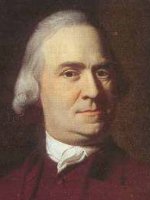In his 1865 biography of Adams, descendant William V. Wells wrote:
There appeared in London this year a printed oration, purporting to have been delivered by Samuel Adams on the 1st of August at Philadelphia. Written in the style of Adams, with but one or two exceptions, it was evidently prepared by some person familiar with his writings. Even his frequent italicizing of words, intended to convey pointed meanings, is not neglected. It must have had an extended circulation, several copies being now preserved in various libraries. Its spuriousness was not suspected in England, where its effect had been the principal object of the author; but whoever was the writer, it is difficult to see what was the immediate point to be gained by the deception. . . . The only contemporary notice was apparently written in London, after a perusal of the oration; and the writer expresses the general opinion of the subtlety of Samuel Adams as beyond that of all others in Congress.In a footnote Wells laid out the “numerous and palpable” arguments against the authenticity of the pamphlet:
1. Congress was in session on the 1st of August, when the oration purports to have been delivered. It is hardly possible that on such an occasion, that body would not have adjourned; and the title-page bears the words, “delivered at the State House.”Wells also stated that “contains certain indecent passages which it would be absurd to suppose for a moment that Samuel Adams could ever have written.” Unfortunately, those were too indecent to point out. Nothing stands out as indecent to my eyes, but I immediately had doubts about Adams quoting Jean-Jacques Rousseau.
2. Contemporary records make no mention of any public celebration on the 1st of August; nor could the signing of the engrossed copy of the Declaration of Independence on the following day have had any association with the speech. None of the American reminiscences of those times refer to it, either in diaries, letters, or newspapers, and it is not likely that so interesting an occurrence would have escaped mention.
3. This professes to be a reprint of the original Philadelphia pamphlet. No such American edition has ever been seen, but at least four copies are known of the London issue.
4. Though the oration is dated nearly a month after the Declaration of Independence, it is silent as to that event, which the unceasing efforts of Adams had particularly pushed to consummation, showing that the author (evidently in London) was ignorant of the Declaration. . . .
6. The oration repeatedly alludes to the “present Constitution” as then in force, as being already “composed, established, and approved.” No constitution existed at this date. The only approach to such an instrument were the Articles of Confederation; and Samuel Adams being one of the committee which had reported them in the previous month, none better than he knew that they had not been approved. Congress, on that very day, resolved upon the consideration of them, and the debate continued far into August, when they were laid aside, and not taken up until the next spring.
In 1875, Charles Francis Adams showed a copy of the oration to the Massachusetts Historical Society while adding that “there was no evidence that Samuel Adams ever delivered such an oration, nor had there ever been discovered a copy published in Philadelphia.”
In the early 1900s, Harry Alonzo Cushing edited a comprehensive collection of The Writings of Samuel Adams. He referred to the pamphlet only in a footnote, citing Wells’s arguments against its authenticity while noting that the text continued to be reprinted “as recently as 1900.” Cushing also quoted a contemporaneous American reference to the “oration” as dubious:
John Eliot of Boston apparently had the matter in mind when he wrote to Jeremy Belknap, June 17, 1777: “Mr S. Adams is a gentleman who hath sacrificed an immense fortune in the service of his country. He is an orator likewise, & there is a famous oration upon the independance of America, which, it is said, he delivered at Philadelphia, January [sic], 1776, but which was never seen in America before.”Today the oration is recognized as a hoax by bibliographers and booksellers. But with so many anthologies of American oratory reprinting the text in the 1800s and early 1900s, the internet has rediscovered it and brought it back as a seemingly authentic statement by Samuel Adams. The sentence “Truth loves an appeal to the common sense of mankind” seems particularly popular and, given the deceptive source, particularly ironic.
TOMORROW: Who created this hoax?

After reading this posting, I decided to look over the Internet Archive and found numerous hoaxes/fraudulent documents without any editorial notes informing readers otherwise and being revived from forgotten obscurity. One particularly egregious example is the Horn Papers an early 20th century hoax about the settlement of the Pennsylvania frontier, which seems to have been revived by the internet and the increased interest in genealogical research.
ReplyDeletehttps://archive.org/details/hornpapersearlyw01horn
One of the projects in my head, and unfortunately nowhere else, is a website cataloguing all the American historical “sources” which have been shown to be dubious or false. Because they’re all coming back!
ReplyDelete